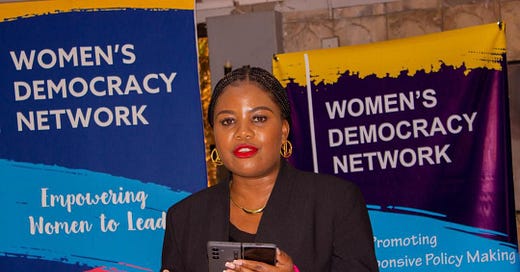Women's Leaders Launch Anti-GBV Campaign in Zimbabwe
The campaign, running June 17-26, seeks to "speak out and raise awareness about the impact of gender social norms on women's public life participation," organizers said.
HARARE, Zimbabwe- Women's rights advocates in Zimbabwe launched a groundbreaking 10-day campaign Monday aimed at promoting gender-responsive policymaking to end gender-based violence and the harmful social norms hindering women's participation in public life, writes Winston Mwale.
The Women's Democracy Network, a coalition of female leaders and gender champions, kicked off the #TimetoAct advocacy blitz calling for accelerated collective action against GBV by all stakeholders.
"It is everyone's responsibility to take action and contribute to shaping a future where women can fully participate, contribute, and thrive in public life," the group said in a statement.
"Together, let's challenge harmful gender norms and create a more just and equitable society for all."
The campaign, running June 17-26, seeks to "speak out and raise awareness about the impact of gender social norms on women's public life participation," organizers said.
It also aims to "inspire the general public to advocate for gender-responsive policies and legislation to end all forms of GBV."
According to the U.N.'s 2023 Gender Social Norms Index cited in the statement, "biased gender social norms hold women back from becoming leaders" despite many formal barriers being removed. It warned that even with women taking leadership roles, there can be a "stronger backlash against women."
The campaign launch follows a WDN training last week where 33 gender champions were equipped on gender-responsive policymaking and advocacy skills "to increase, strengthen and enhance women's representation" in governance.
"Gender Champions are envisaged as responsible leaders who will facilitate an enabling environment within various institutions where women are treated with dignity and respect," the statement said. Newly trained advocates have begun initiatives at home, in communities and faith groups.
The group decried how "religious, cultural and traditional beliefs and practices" restrict women, confining them to caregiving roles, prioritizing housework and portraying women as unfit for leadership.
"We need to promote gender-responsive policymaking and support women's leadership programs so survivors access justice, protection and support," organizers said, urging institutional reforms on service delivery, resources and accountability.
With only 7 years until 2030 targets, the statement warned "a mere 15.4% of Goal 5 indicators on gender equality are on track" per U.N. data.
It could take 286 years to achieve gender parity in legal protection at the current rate.
The campaign calls on media, businesses, activists and officials to speak out, volunteer, host events and push duty bearers on reforms.
"It's time to act to end GBV," organizers said.



